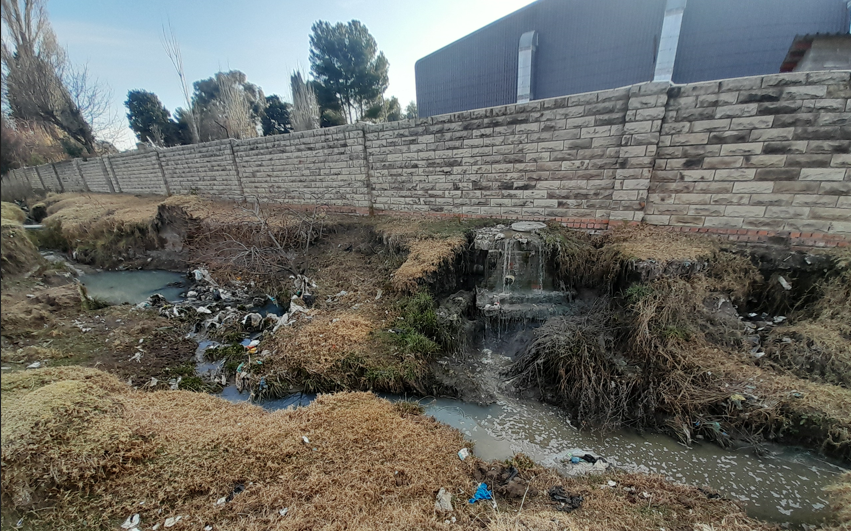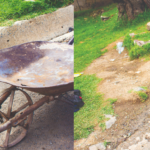A sewage spill first reported by Newsday at the beginning of this year is still continuing unabated, with untreated wastewater flowing directly into Raleting Dam, one of the main water sources for Mafeteng town and its surrounding villages.
The persistent discharge originates from a maintenance hole located behind the National Drug Service Organisation (NDSO). Wastewater can be seen leaking consistently from a pipe, flowing untreated into a stream that feeds directly into the dam.
The surrounding land has been severely eroded, a clear indication that the spill has been ongoing for a significant period. The presence of foam, discoloured water, and litter points to potential contamination that could pose serious health risks to nearby residents and the ecosystem.
Asked to comment, Matebele Sefali, the NDSO Manager, told Newsday: “The leaking pipe is not NDSO’s, it is WASCO’s. We are not in a position to answer any questions regarding that.”
In response to inquiries, Bahlakoana Leshasa, Public Relations Officer for the Water and Sewerage Company (WASCO), said he had consulted the Southern Region Area Manager, who confirmed that the matter was raised in a recent meeting involving WASCO, the District Administrator (DA), and the Urban Council.
According to Lehasa, the pipeline in that area was severely blocked with mud, hair from salons, fat from businesses, and other debris. He also revealed that many local businesses were not properly connected to the sewage line, which has exacerbated the situation.
Lehasa said the meeting, held on Wednesday this week, resolved that WASCO will acquire new equipment to reconstruct the sewage line from scratch. Once the necessary machinery is in place, work is expected to begin, he said.
He indicated that WASCO has also appealed to the District Administrator to engage the business community and encourage them to connect to the sewage network.
“As WASCO, we have no right to force anyone to connect to the sewage line. All we can do is close off their water supply, but they often find alternative ways to access water, and our problem remains unsolved,” Lehasa explained.
He confirmed that WASCO bears full responsibility for addressing the current situation.
This position, however, contrasts sharply with WASCO’s initial response to Newsday in January. At that time, the company claimed it was unaware of the spillage, although it acknowledged the risks associated with such pollution.
“We are not aware of the incident in question. However, we are aware of the potential pollution that this can bring. Unfortunately, gravity sewer lines are constructed at elevations lower than the households they serve,” WASCO said in a written statement at the time.
The company further explained that it regularly tests both raw and treated water and ensures compliance with water treatment standards.
“To this point, there have not been failures in the quality of either the raw or treated water. For this reason, we have not found it necessary to alert any authority about the issue. The company attends to sewerage overflows timeously and rehabilitates sewer lines when needed to minimise disruptions,” it said.
Section 39(1) and (2) of the Environment Act of 2008 makes it clear that discharging harmful substances into water sources is illegal.
The Act states: “No person shall discharge any poisonous, toxic, exotoxic, obnoxious substance, or any matter which is likely to cause harm to human health or the aquatic environment into any waters.”
Anyone found guilty of such an offence is liable, upon conviction, to a fine not less than M5,000 or imprisonment for not less than two years, or both.
The only exception applies when such discharge is for the purpose of treating water or aquatic life.
Summary
- A sewage spill first reported by Newsday at the beginning of this year is still continuing unabated, with untreated wastewater flowing directly into Raleting Dam, one of the main water sources for Mafeteng town and its surrounding villages.
- In response to inquiries, Bahlakoana Leshasa, Public Relations Officer for the Water and Sewerage Company (WASCO), said he had consulted the Southern Region Area Manager, who confirmed that the matter was raised in a recent meeting involving WASCO, the District Administrator (DA), and the Urban Council.
- He indicated that WASCO has also appealed to the District Administrator to engage the business community and encourage them to connect to the sewage network.

Ntsoaki Motaung is an award-winning health journalist from Lesotho, specializing in community health stories with a focus on sexual and reproductive health and rights, as well as HIV. She has contributed to platforms like “Be in the KNOW,” highlighting issues such as the exclusion of people with disabilities from HIV prevention efforts in Lesotho.
In addition to her journalism, Ntsoaki serves as the Country Coordinator for the Regional Media Action Plan Support Network (REMAPSEN). She is also a 2023 CPHIA Journalism Fellow.







